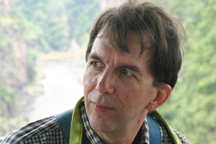In the early 1950s, “The New York Times” ran a headline saying “God is dead.”
Along with the invention of the printing press and the dropping of the first nuclear bomb, the headline signified a major shift in world perception and an emerging philosophy called “existentialism.”
Critics have dubbed this as “the philosophy of selfishness,” marking a shift from previous philosophical beliefs in social order to one that emphasizes the individual.
Unlike philosophies of the past, existentialism claims individuals invent reality as they go along, setting their own individual standards that may or may not be agreed upon by society.
Although this theory of reality has its roots in the 19th century, it did not take shape until post World War II, when many of the world’s greatest thinkers began to question the wisdom behind other philosophies that helped shape the creation of human atrocities – such as the rise of Nazism and the Holocaust.
“These people are trying to get at problems and involve a more agile type of thinking.” – David Cogswell
________
Although Hoboken author and former editor at “The Hudson Reporter,” David Cogswell, paints a sympathetic picture in his new book, “Existentialism for Beginners,” the theories that help shape it constitute the central conflicts of modern society, including whether or not God exists, and the role human’s play in shaping their own reality.
Existentialism is a term that has been applied to the work of a number of 19th and 20th century philosophers, who – despite sharp differences – agree that the world is essentially an absurd place and that people through their actions, feelings and life help give the world meaning. Although not all the philosophers associated with existentialism refute the concept of God, most believe that disorientation and confusion are the natural human reaction to meaninglessness in the world.
In the past, great thinkers and religious leaders assumed that God or the universe had a natural order that regulated human lives. Existentialism maintains that the world is largely chaotic and that humans as individuals bring order to that chaos through their thoughts and actions.
In some ways, existentialism describes the plight of modern man – a person who, stripped of God, must find his or her way through the world, and find his or her own meaning. The cost to each individual is angst and loneliness.
Instead of being created as part of some master plan, people are born and then struggle to make sense of the world, defining his or herself – and this definition is derived by how he or she acts. If you act cruelly, then you are cruel. But in this concept, there is the belief that a cruel person is capable of changing the direction of his or her life at any time.
In his book, “Existentialism for Beginners,” Cogswell takes a lighter look at the controversial philosophy. In explaining its history and basic concepts, Cogswell provides the positive impacts of what is likely to become the philosophy of the modern age. Out of this theory rose many of the modern movements involving gay rights, feminism, and environmentalism.
Like the 19th century political movement of anarchy, existentialism places the full responsibility for world outcomes on the backs of individuals. People cannot blame the past for their woes, since they create their world as they move through it.
Cogswell’s book introduces the basic concepts of the theory and shows its development, tracing its roots to German philosophers Jaspers and Heidegger, and later, its emergence as a major movement in Post WWII France in the works of Jean Paul Sartre, Albert Camus, and Simone de Beauvoir.
Cogswell’s book is a basic primer for anyone who wishes to understand the dynamic changes the world went through after WWII, and the psychological struggle many suffered when faced with the concept of a world devoid of superimposed theories and social movements – and gives a better understanding of the concepts against which many traditional power structures on the political right and left rebel.
Many of the previous philosophical theories about reality tended to turn into religious debates or turn politicians into gods.
“The old theories don’t work for living life,” Cogswell said during a recent interview. “Existentialism is a system of inquiry.”
Theorists fall into a variety of political camps, but all question the basic concepts that have led the world until the dawn of the 20th century.
Cogswell said the vast array of brilliant minds associated with existentialism fascinated him, even some of the people which he disagreed with politically.
What makes existentialism different from other philosophies is that it lacks the dogmatic approach of the past, Cogswell said. The philosophy is really a system of inquiry, a searching out of truth, not a declaration of principles.
“These people are trying to get at problems and involve a more agile type of thinking,” Cogswell said.
For Cogswell, his fascination with the subject became an education, and the more he tried to explain it, the more he learned. In some ways, he came to it from an odd angle by starting in the present and looking at the overall reaction against it.
“It didn’t even have a name after World War II,” he said.
Some of those closely associated with the theories from the past would have likely objected to being lumped in as existentialists, although they gave the foundations to the theory.
Those interested in delving into this fascinating mix of thinkers can order the book at Unique Books on Broadway near 21st Street in Bayonne or online at Amazon or other book sellers.
